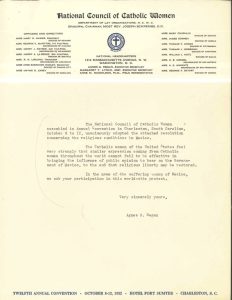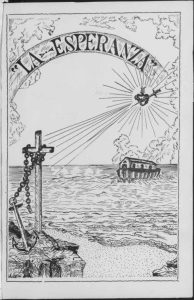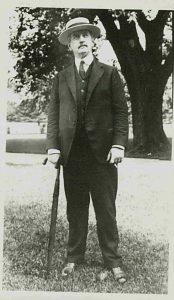Scattered throughout Catholic University’s Special Collections are a range of resources related to the history of Mexico. We are happy to offer a new Library Guide to those materials. Here are a few of the highlights:

The National Catholic Welfare Conference, forerunner of the U.S. Conference of Catholic Bishops, became involved in U.S.-Mexican affairs just after its founding in the early 1920s. Mexico-related records can be found throughout this enormous collection, partly due to the migration of Mexican Catholics into the U.S. at the time, but also because the bishops were concerned with the unstable political conditions in that country leading to persecution of Catholics in the 1920s. The archives, which holds the NCWC/USCCB records, contains a series of records known as the “Mexican Files,” Subseries 1.4, of the NCWC/USCCB Office of the General Secretary, which document the precarious position of the church in Mexico and attempts by U.S. Catholic authorities to stabilize such conditions. The Office of the General Secretary files also contain various materials throughout related to Mexican relations and migration which one can find by doing a simple search of the finding aid.
Established in 1920, the NCWC Press Department provided the Catholic press, radio, and eventually, television in the United States and other countries with news, editorial, feature, and picture services gathered and prepared by professional journalists and released under the names NCWC News Service and Noticias Catolicas (in Spanish and Portuguese for Latin America). Both services were designated by the abbreviation (NC) and the former later known as the Catholic New Service (CNS). Administrative files include correspondence, general subscriber files, obituary files for prominent Catholics, and miscellaneous publications and press releases. The NCWC/CNS finding aid can be found here.

Hosted by the Catholic Research Resources Alliance the from The Catholic News Archive contains more than 30,000 issues of digitized Catholic newspapers comprising over 600,000 pages of news.
Included are digital copies of the Catholic News Service Press releases, La Esperanza of Los Angeles (ca. 1929-1954), The Monitor of San Francisco, and several other publications publishing Mexico-related articles.
Agustín Iturbide y Green (1863-1925), grandson of Emperor Agustín Iturbide I (1783-1824), was born in Mexico City during the French occupation of the country in 1863. Desiring a Mexican heir, Emperor Maximilian I, an Austrian by birth, arranged to adopt the younger Iturbide, then two years old, in 1865. Following the collapse of Maximilian’s regime in 1867, young Agustín was reunited with his birth parents in Havana, and resided with his mother in the United States until 1875 before leaving to study in Brussels. Agustín remained in Europe for many years before returning once again to attend graduate school in Washington, D.C. He was awarded a master’s degree in Linguistics from Georgetown University in 1884.
Iturbide returned to Mexico in 1887 to enter the Military Academy in Chapultepec. Although he had aspirations for a storied military career, his criticisms of the Porfirio Díaz regime in both a New York newspaper and in personal correspondence resulted in his being court-martialed in 1890. Convicted of insubordination, he was sentenced to one year in prison and was subsequently exiled.

Financially ruined and grieving for his mother, who passed away during attempts to salvage the family fortune, Iturbide moved to Rosedale to teach Spanish and French at Georgetown University. It was there, that he met Louise Kearney, who would become his wife in 1915. The Kearneys were a prominent Washington family whose ancestors had emigrated from Ireland in the late 1700s.
Iturbide continued to teach until his death from tuberculosis in 1925. Louise Kearney lived the rest of her life in a small P Street apartment and became friends with Catholic University procurator Msgr. James Magner, to whom she entrusted this collection in 1957.
This collection contains original documents from the Iturbide family from Emperor Agustin Iturbide I’s reign until the death of his grandson, Agustín Iturbide y Green, including correspondence, Mexican governmental documents, military medals and coins, newspapers, magazines, and portraits. The Kearney section contains correspondence and portraits from Louise Kearney, Iturbide’s wife from 1915 until his death.
Note that this collection is digitized and all of the links to the digitized documents are in the finding aid.
A link to the Iturbide-Kearney papers’ finding aid can be found here.
The National Council of Catholic Women (NCCW) was established in 1920 as an initiative of the Lay Organizations Department of the NCWC. One to three women represented each of the 114 dioceses of the time. As the first federation of Catholic women’s organizations, the NCCW was able to provide a unified voice for the thousands of independent Catholic women’s organizations that existed in the United States, to offer resources for united actions, to ensure official Catholic representation in national movements, and to stimulate the local efforts of the women’s organizations.
The NCCW records span 1917-2000 and consist of administrative records and minutes, correspondence, national and international project notes, publications, photographs, and scrapbooks. While there are over 200 boxes of records in this collection, one can do a search for Mexico-related materials; specifically, series 7 (International Organization Affiliations, 1919-1984), boxes 111-142 (especially 115-116) contain materials related to the NCCW’s involvement with international organizations. A link to the NCCW finding aid can be found here.
A selected list of texts from our Rare Books collection related to the history of Mexico can be found here.
A full list of Mexico-related resources from Special Collections can be found in this Mexico-related Library Guide.
